Top U.S. policymakers and industry leaders met this week for The Roundtable’s State of the Industry (SOI) Meeting in Washington, DC to discuss policy issues of compelling interest to CRE.
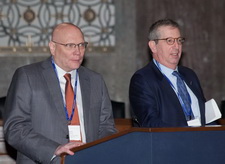 |
Launching the SOI meeting on Wednesday, Roundtable Chair William C. Rudin ( Rudin Management Company, Inc. ), right, and Roundtable President and CEO Jeffrey DeBoer, left, noted how Roundtable efforts are the result of research and analysis to find correct answers that benefit economic growth and job creation. |
The Roundtable also issued its 2018 National Policy Agenda: Building For The Future. Specific issues included in the Policy Agenda were identified after a comprehensive, annual membership survey; frequent meetings held by The Roundtable's policy advisory committees (see below); and participation by The Roundtable's Board of Directors.
Launching the SOI meeting on Wednesday, Roundtable Chair William C. Rudin (Rudin Management Company, Inc.) noted how Roundtable efforts are the result of research and analysis to find correct answers that benefit economic growth and job creation. Rudin also said that the organization consistently communicates positions to policymakers that illustrate how healthy real estate markets are intertwined with the entire economy. This approach – "analysis first, followed by advocacy" – will continue to be the model for The Roundtable through 2018 and beyond, Rudin commented.
Illustrating how The Roundtable relies on member participation, he commented on the organization's successful 2017 policy year regarding tax policy, sustainability and other efforts: "This past year we had great participation from Roundtable members who traveled to Washington when needed to personally meet with policymakers and discuss the obvious, and sometimes not so obvious, consequences of a policy decision."
He added, "We testified, wrote comment letters, led industry coalitions, submitted economic analysis, organized targeted meetings, and continued to brand The Roundtable as a trusted voice on national policy issues."
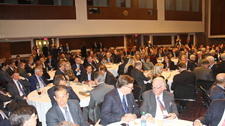 |
Illustrating how The Roundtable relies on member participation, Rudin spoke about the organization's successful 2017 policy year regarding tax policy, sustainability and other efforts to the SOI audience. |
Rudin also outlined various policy initiatives The Roundtable will focus on in the upcoming fiscal year with the Trump Administration and Congress, including implementation of the new tax law; financial regulatory issues; internet sales tax; infrastructure; attracting overseas tourists through the "Visit U.S." coalition; and high performance buildings — all vital to spurring job creation and sustaining economic growth.
Roundtable President and CEO Jeffrey DeBoer then offered an overview of the recent changes in tax law, along with upcoming issues in play. He also noted the vital role of The Roundtable's 17 national real estate trade association partners in presenting a unified voice on issues to policymakers in Washington.
Policy Issues and Meeting Speakers
Five U.S. Senators were among the featured SOI guests, which included:
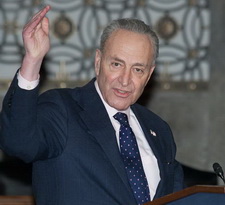 |
Senate Minority Leader Chuck Schumer (D-NY) engaged Roundtable members on the need for a massive plan to revamp the nation's airports, bridges, roads, seaports, broadband and other critical infrastructure. |
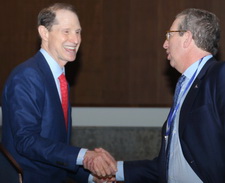 |
Sen. Ron Wyden (D-OR), left, ranking member of the Senate Finance Committee, spoke about the need for a bipartisan effort to address low income housing needs. |
Roundtable Policy Committees
In conjunction with the SOI Meeting, The Roundtable's Policy Advisory Committees met on Jan. 24-25, discussing policy issues in detail with high-level congressional and agency staff.
 |
In the wake of the most significant tax measures passed in 31 years, TPAC attracted a large audience to address the details of what lay ahead in implementing the new tax law. |
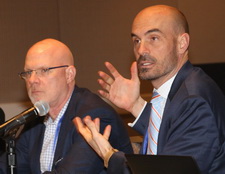 |
SPAC hosted Dr. Joseph Allen, Assistant Professor, Harvard T.H. Chan School of Public Health, right and John Mandyck, Chief Sustainability Officer, United Technologies Corporation, left, who presented new research on the health co-benefits of Green Buildings. |
Next on The Roundtable's FY2018 meeting calendar is the Spring Roundtable Meeting on April 25 at The Newseum in Washington, DC. This meeting will be restricted to Roundtable-level members only.
A six-page document leaked to the media this week purports to show details of the White House’s anticipated infrastructure plan just before President Trump is scheduled to offer his first State Of The Union address on Jan. 30. White House spokeswoman Lindsay Walters declined to comment on the contents of the leaked document, but said the Administration looks forward to announcing a plan "in the near future." (Axios, Jan. 22)
 |
A six-page document leaked to the media this week purports to show details of the White House’s anticipated infrastructure plan just before President Trump is scheduled to offer his first State Of The Union address on Jan. 30. |
According to the document, leaked Monday to Axios and Politico, approximately 10 percent of the plan’s funds would go to “transformative projects” – a category that includes a “commercial space” sector that could compete for funds. (CQ, Jan. 25)
The Roundtable on Jan. 11 sent a comment letter to President Trump offering specific suggestions on how innovative financing sources may be used to help pay-for infrastructure – and how restructuring a lengthy permitting process and cutting unnecessary red tape will help control project costs and delays.
Sen. John Barrasso (R-WY), chairman of the Senate Environment and Public Works Committee, said that permit streamlining would be an important part of an infrastructure plan. (CQ, Jan. 23). Barrasso’s committee oversees all public works projects and the Environmental Protection Agency, which would be a path to streamlining EPA and other agencies’ permitting approvals.
The Roundtable letter suggests several innovative financing sources, including:
The Roundtable on Jan. 11 sent a comment letter to President Trump offering specific suggestions on how innovative financing sources may be used to help pay-for infrastructure – and how restructuring a lengthy permitting process and cutting unnecessary red tape will help control project costs and delays. |
More details on each of the suggestions above are included in The Roundtable letter.
Also this week, Special Assistant to the President for Infrastructure Policy DJ Gribbin met on Tuesday with Roundtable members in an open exchange of ideas about a national infrastructure plan. On Thursday, Gribbin spoke to the U.S. Conference of Mayors about the Trump Administration’s upcoming plan, stating that it will not require any new funding. Gribbin said that 200 billion dollars in existing federal funds would be shifted to infrastructure projects, which would be leveraged to attract an additional 800 billion in state and private investment. (CQ, Jan. 25)
Infrastructure was a major topic of discussion during The Roundtable's Jan. 24-25 State of the Industry meeting (see story above). The Roundtable will remain engaged with policymakers as the Administration’s infrastructure plan moves forward in 2018.